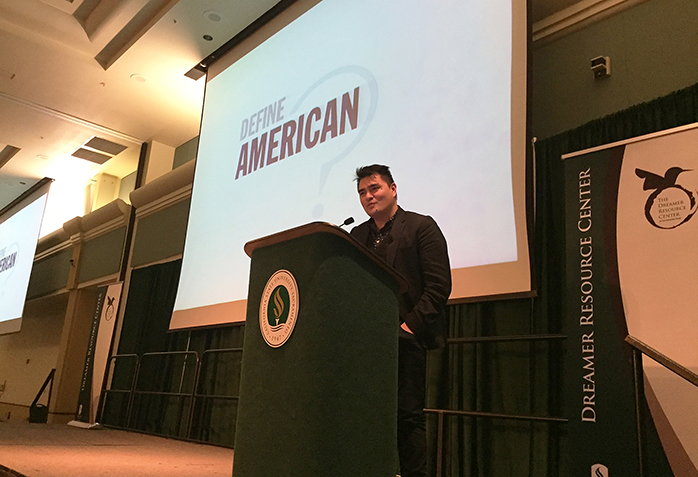A Pulitzer Prize-winning journalist and undocumented immigrant was the keynote speaker at Sacramento State’s “Keeping the Dream Alive” summit on Monday, which focused on the concerns of undocumented students on campus.
Jose Antonio Vargas won a Pulitzer Prize for his reporting on the 2007 Virginia Tech massacre. He revealed his status as an undocumented immigrant in a 2011 essay in The New York Times Magazine.
Vargas began by discussing three lessons people should take away from the election of Donald Trump to the U.S. presidency earlier this month. One of President-elect Trump’s campaign promises was to create a “deportation force” to remove undocumented immigrants from the country.
Vargas’ first lesson was that America is “living through a civil war and a reconstruction all at once” as the nation deals with both greater ethnic diversity and greater resistance to immigration.
Vargas’ second lesson was that “the un-whitening of America requires uncomfortable honesty and radical empathy.”
“It takes radical empathy for people of color to not quickly call white people racists and personalize racism,” Vargas said. “It takes radical empathy for college students of color to engage your white classmates in actual conversations.”
Vargas said that another part of “radical empathy” is taking the time to listen to people who voted for Trump.
“This isn’t just about Trump; this is about white working class people across this country who feel left out,” Vargas said. “If we’re gonna have empathy, what kind of empathy must we show for white people who feel like that? Instead of calling people names, why don’t we try to figure out where they’re coming from and try to figure out where the connection is?”
The third lesson was that new language challenging mainstream political and social narratives is “imperative.”
“I want you to think about the anti-immigrant, anti-Muslim, anti-Black, sexist language that characterized the presidential campaign that just ended,” Vargas said, before quoting Nobel Prize winning writer Toni Morrison. “ ‘Oppressive language does more than represent violence; it is violence.’ ”
Vargas said that using new language and constructing new narratives would help bring issues faced by people of color to the fore, citing LGBT activism as a successful example of how that can be done.
“The same shift must happen on immigrant rights if we’re going to get out of this Republican-Democrat binary,” Vargas said. “I think it’s very important that we complicate the narratives.”
During the question-and-answer session, Sac State staff member Debbie James asked Vargas how minority stories can be better represented in the media.
“How can we get our voices, voices like yours, on mainstream media?” she asked. “I see a domination of articles about Donald Trump, what he’s doing, what he said, and the ‘Hamilton’ cast. I mean, this is all we’re seeing.”
Vargas agreed with James’ sentiment, saying that the lack of diversity in newsrooms causes issues such as policing and immigration to be covered in a certain way and said that a solution was to support independent media.
“How do we support independent media? How do we make sure that we are vigilant in where we get out information?” Vargas asked.
Sac State student Carson Huber asked how Vargas responds to “minority racism,” saying that he disagreed with the tactics of Black Lives Matter protesters.
“How do you try to combat minority racism?” Huber asked. “I don’t see you by your race, orientation, or anything. I see you as a person.”
Vargas challenged the premise of Huber’s question.
“Minority racism doesn’t exist, right? Because racism comes from white supremacy, so only white people can do that,” Vargas said, before telling a story about how he challenged a family member for calling somebody a “basic white girl.”
“My point is, for many people of color our reaction toward white people and whiteness as a construct is our experience of having to exist in a system that doesn’t have places for us,” he said.






